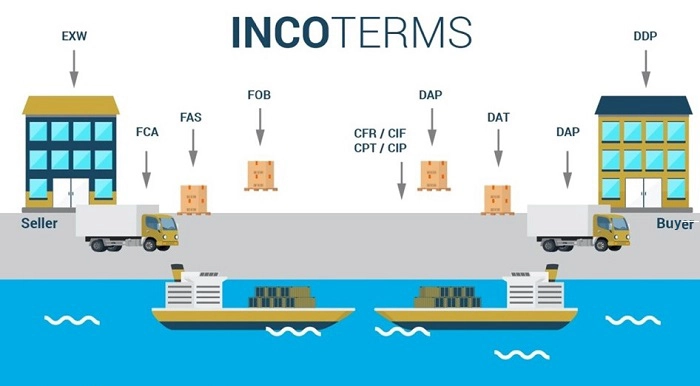If you are involved in international exports, understanding
what Incoterms are and what they are for is essential to ensure the correct categorization and distribution of your goods, so that you can avoid any kind of inconvenience with customs agents.
In foreign trade there must be universal rules and formalities in order to reach agreements and close deals that are convenient for both importers and exporters.
If you have heard the term
"Incoterms", but you are not sure what they are, we will explain what Incoterms are, what their classification is, which are the most used Incoterms and how you can use them correctly.
Before getting into the subject, it is important to highlight that Incoterms have existed in foreign trade since 1936, they were created by the International Chamber of Commerce and, since then, they have been modified to the different commercial practices from that moment until today.
What are Incoterms?
Incoterms, which stands for "International Commercial Terms", are universal rules that define transactions between importers and exporters.
With Incoterms, both parties understand the responsibilities, costs, tasks and risks, as well as the handling of logistics and transportation, from the departure of the product to its reception in the country where the purchase was made.
In short, to understand what Incoterms are, you should know that they are certain guidelines that establish the criteria for distribution, costs, and delimit the responsibilities between the buyer and the seller.
What are the objectives of Incoterms?
In addition to the aforementioned, Incoterms determine several aspects such as:
1.The agreed price of the goods and its scope.
2.The place of delivery of the goods.
3.The person in charge of contracting and paying for transportation.
4.To establish the transfer of risks on the goods from the seller to the buyer.
5.The documents processed by each party and their cost.
6.The person in charge of contracting and paying the insurance.
From the above list, there are several very important aspects of Incoterms that can be explored in more depth:
Delivery of goods: It is an obligation for the seller once the transaction is agreed with the buyer.
Distribution of costs: It is customary for the seller to bear all costs to ensure that the goods arrive at their destination in good condition, while the buyer bears any remaining costs that may arise.
Customs formalities: The seller is in charge of the export documents, except in the case of Incoterm EXW (Ex Works, In Factory, which we will discuss later) where the buyer is responsible for the export.
Transfer of risks: Although it may seem minimal, this aspect is extremely important in Incoterms, since it ensures that the transfer of risks, and even expenses, takes place in the place and at the time previously defined.
What are the most commonly used Incoterms?
We have already talked about each of the 11 Incoterms available in International Trade, and specified which are the 4 most used Incoterms.
This is based on the fact that 70% to 80% of foreign trade shipping operations are governed by these 4 international trade Incoterms, and they are the most commonly used Incoterms for exporting and importing.
Remember that these 4 most used Incoterms are:
1.
Incoterm EXW (Ex Works / Ex works)
2.
Incoterm FOB (Free on Board / Libre a bordo)
3.
CFR Incoterm (Cost and Freight)
4.
Incoterm CIF (Cost, Insurance, and Freight / Coste, seguro, flete)
In conclusion, we can highlight a few points:
Incoterms have existed since 1936 and are updated every 10 years. The Incoterms in force at this moment (2022) are those of the 2020 - 2030 version.
Incoterms establish the criteria for distribution, costs, and delimit the responsibilities between buyer and seller.
There are 11 Incoterms in force: EXW, FCA, FAS, FOB, FOB, CFR, CIF, CPT, CIP, DPU, DAP and DDP.
The 4 most commonly used Incoterms are: EXW, FOB, CFR, CIF.
We hope that this guide on the most used Incoterms in Latin America has been a helpful tool to facilitate the commercial activities of your company.
Finally, keep in mind that China Latin you can find a great variety of financial services that will allow you to optimize your company's resources to obtain greater growth in the industry d foreign trade.
Written by Luis
